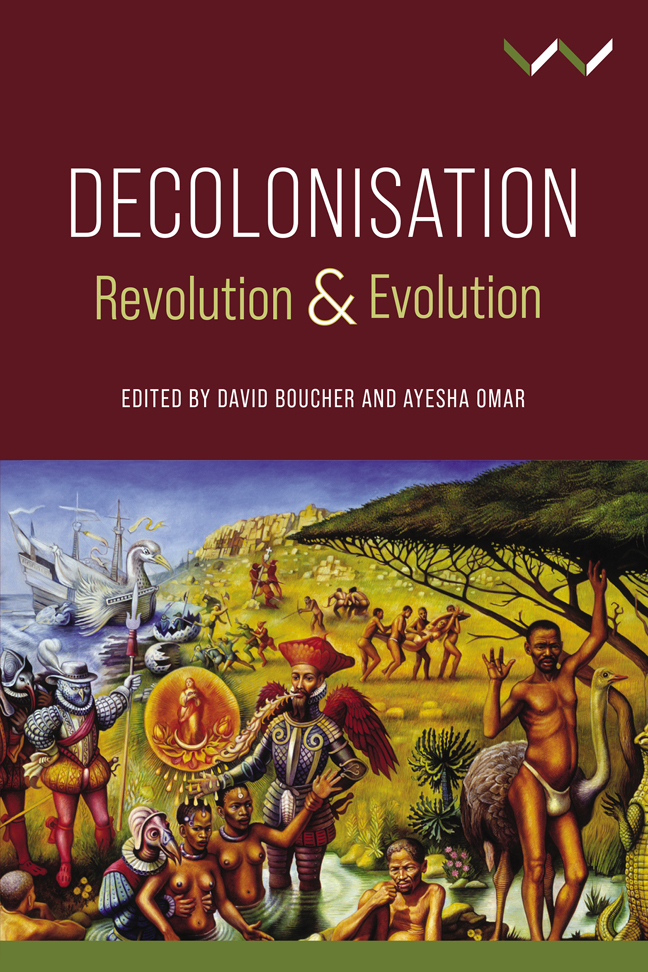Book contents
- Frontmatter
- Contents
- Acronyms
- Introduction: Decolonisation: Interdisciplinary Perspectives
- Chapter 1 The Invention of Blacks: Notes on Conquest, Fear and Time
- Chapter 2 The Decolonisation of Southern Africa: Historical Reflections
- Chapter 3 The Border of Trust at Kat River for Coloured Settlers, 1851–1853
- Chapter 4 Decolonisation and the Enduring Legacy of Colonial Borders in Africa
- Chapter 5 Fanon's Challenge: Identity, Recognition and Ideology
- Chapter 6 Beyond Redemption: Unsettling Progressive-Romantic Storyings of Colonial Injustice in Western Critical Thought
- Chapter 7 The Limits of Decolonisation and the Problem of Legitimacy
- Chapter 8 Decolonisation – Real and Imagined
- Chapter 9 Decolonisation and the Crisis of African Literature in the Twenty-First Century
- Chapter 10 Pedagogical Disobedience in an Era of Unfinished Decolonisation
- Contributors
- Index
Chapter 1 - The Invention of Blacks: Notes on Conquest, Fear and Time
Published online by Cambridge University Press: 01 March 2024
- Frontmatter
- Contents
- Acronyms
- Introduction: Decolonisation: Interdisciplinary Perspectives
- Chapter 1 The Invention of Blacks: Notes on Conquest, Fear and Time
- Chapter 2 The Decolonisation of Southern Africa: Historical Reflections
- Chapter 3 The Border of Trust at Kat River for Coloured Settlers, 1851–1853
- Chapter 4 Decolonisation and the Enduring Legacy of Colonial Borders in Africa
- Chapter 5 Fanon's Challenge: Identity, Recognition and Ideology
- Chapter 6 Beyond Redemption: Unsettling Progressive-Romantic Storyings of Colonial Injustice in Western Critical Thought
- Chapter 7 The Limits of Decolonisation and the Problem of Legitimacy
- Chapter 8 Decolonisation – Real and Imagined
- Chapter 9 Decolonisation and the Crisis of African Literature in the Twenty-First Century
- Chapter 10 Pedagogical Disobedience in an Era of Unfinished Decolonisation
- Contributors
- Index
Summary
Taking South African history as its starting point, this chapter will defend a hypothesis that Blacks are creatures of war, invented during the conquest of the indigenous peoples in the unjust wars of colonisation. As a method of establishing sovereignty, conquest is not simply the defeat of the Other in war but describes instead a relation of domination that can potentially arise following the defeat itself. Making this point, Thomas Hobbes maintains that ‘he … that is slain is overcome, but not conquered; he that is taken, and put into prison or chains is not conquered … But he that upon promise of obedience hath his life and liberty allowed him is then conquered and a subject and not before’ (Hobbes 1996, 720). Throughout Black history, following this ‘promise of obedience’, the conqueror has used the fear of death of the conquered through the systemic and systematic deployment of deadly violence to reinscribe the terms of covenant. After a discussion of the evolution of the right of conquest in Western philosophy and its historical application in South Africa, we will discuss the political ontology of Blackness by focusing upon the question of time. We show that around the world, wherever Blackness exists, it is accompanied by its own horology, which we will examine by focusing on three of its components: ‘lifetime’, ‘age’ and ‘free time’.
THE HISTORICAL USE OF THE JUST WAR DOCTRINE, WITH SPECIFIC FOCUS ON THE ‘RIGHT OF CONQUEST’
In 1542, the Spanish Dominican priest Bartolomé de las Casas published his Short Account of the Destruction of the Indies (De las Casas 1992), based on what he had witnessed during his accompaniment of the conquistador Diego Velázquez de Cuéllar on some of the voyages leading to invasion and conquest of Latin America. Political theorist Yves Winter (2012) points out that one of the things that stands out in De las Casas’ account of the violence and political struggle involved is that he does not use the term ‘conquest’. Winter argues that De las Casas deliberately avoids use of this term to describe the seizure and subjugation of the Americas.
- Type
- Chapter
- Information
- DecolonisationRevolution and Evolution, pp. 27 - 56Publisher: Wits University PressPrint publication year: 2023

